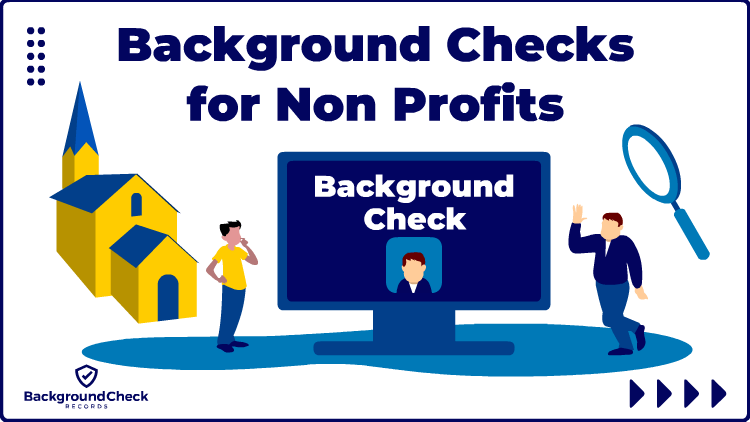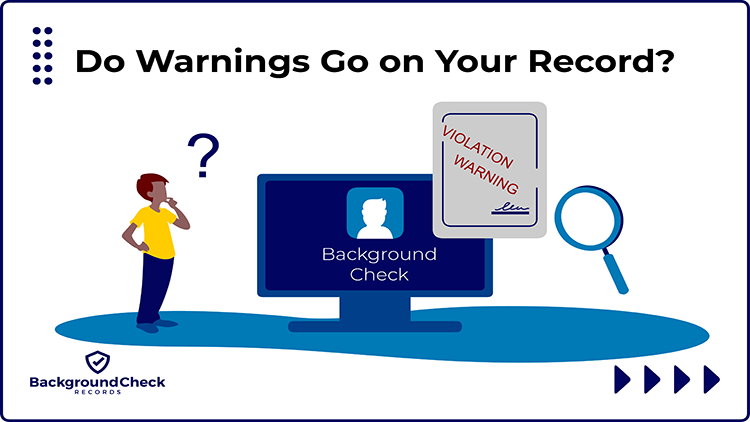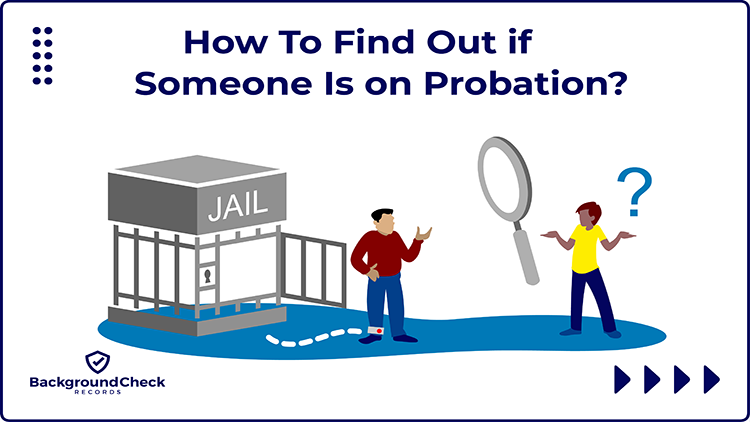Free Non Profit Background Checks (Organizations & Volunteers)
Non profit background checks help ensure the volunteers who work with the elderly, children, victims of crime, and other marginalized individuals do not risk or harm the population served. They typically check state records such as criminal history, child abuse, sex offender registries, etc. but they also check federal records depending on the type of position and thoroughness of the background check.
When considering ¼ of the United States adult population volunteers in any given year and many times they’re unsupervised, double checking they’re a Good Samaritan or making sure your own record is clean using the free background check form above is always a good idea before moving forward.1
Ultimately it’s up to the organization to vet their volunteers and to protect marginalized individuals through a screening process, so knowing exactly how to get it done, laws surrounding background checks, the government entities that perform them, and disqualifying offenses can help to expedite the process for organizations and alleviate any worry for volunteers who are undergoing screening.
Background Check for Non Profit Organizations: Where To Search for Free
Nonprofit organizations rely on volunteers for their daily operations, which is why it’s important to know where to get a background check completed. Since nonprofit organizations also have limited budgets, free or near-free options that provide reliable results are also a major consideration.
There are several governmental agencies that can provide free (or reduced) background checks for not-for-profit agencies.
Local Police Department or Sheriff’s Office
The first place to start for nonprofit background checks is the local police department or sheriff’s office. Law enforcement keeps records on incident response and arrest warrants, and some allow these to be searched online or will provide information upon request by an authorized party.
For example, Travis County Sheriff’s Office in Austin, Texas has an online warrant search portal that a nonprofit director or board member can search to see if a candidate has an outstanding warrant. If there is a warrant, the agency can weigh the alleged offense with the person’s ability to perform the volunteer duties.2
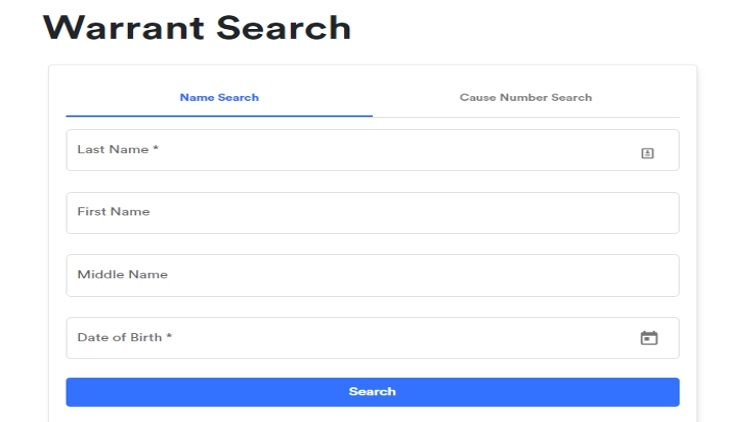
Another example is a background check in Miami through the Miami Gardens Police Department. Residents of Miami Gardens can obtain a background check through the local police department for $5 per record.
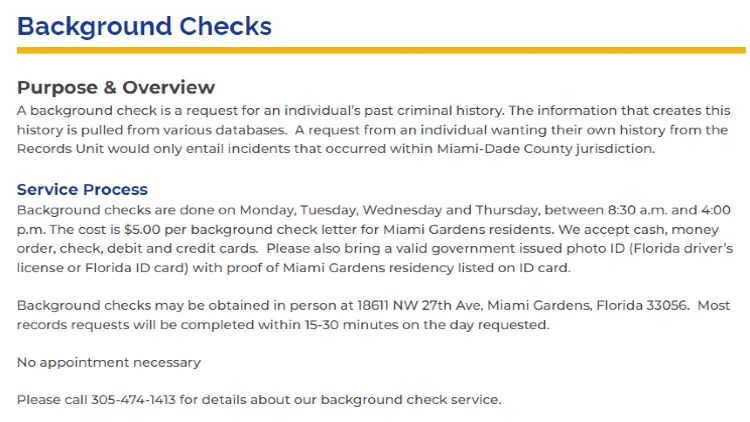
This will return information in the Miami-Dade jurisdiction only and can be used when a nonprofit organization requires a volunteer to submit a background check on their own.3
A local law enforcement agency is a great place to start when conducting a volunteer background screening, but the information obtained may be limited and a broader search is necessary.
State Level Background Checks (Level 1 Background Checks)
Employment background checks, often referred to as level 1 background checks, are primarily conducted at the state level, which also encompasses screenings for volunteers. In most cases, the record checks are processed by the state police or public safety division. Criminal background checks for nonprofit organizations can be state or national screenings.
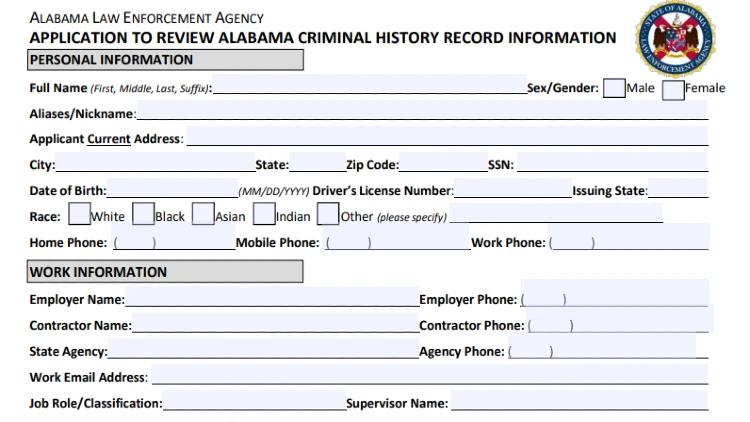
The table below shows where an organization can get a volunteer background check in each state. For example, an Iowa background check and an Arkansas background check are conducted by the state law enforcement agency.
While state searches may sometimes give the option for a nationwide search, this often means the state agency coordinates with the Federal Bureau of Investigation to obtain a National Instant Criminal Background Check or an Identity History Summary Check (Rap Sheet) to fulfill the nonprofit’s background check request.4
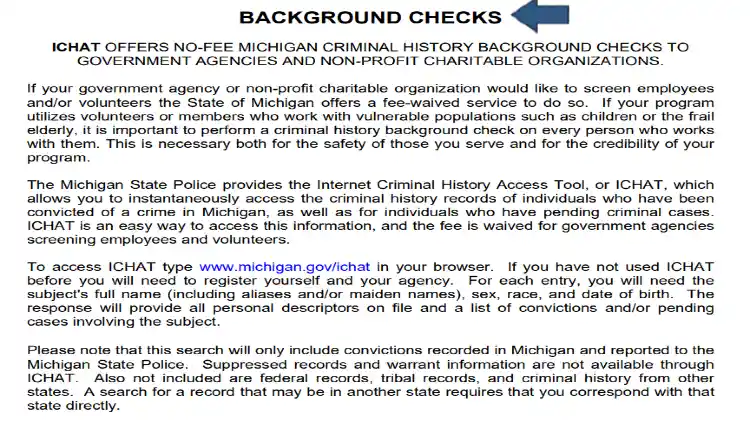
The reasons for background checks vary from agency to agency as well as the duties the volunteer will perform.
Non profit Background Checks: How to Complete a Background Check for Nonprofit
There are a number of reasons for a background check for a nonprofit organization, and the ways to complete a non profit background check are similar to the process for for-profit business and public sector or governmental agencies.
Nonprofit organizations often work with vulnerable populations such as children, the elderly, crime victims or other marginalized individuals, so it is vital to make sure the individuals working for the agency, both paid and volunteer, will not create a risk of harm to the populations served.
To shed light on the importance, a study found 5 out of every 100 volunteer applicants had a criminal conviction after analyzing the data from a top non-profit background screening provider.
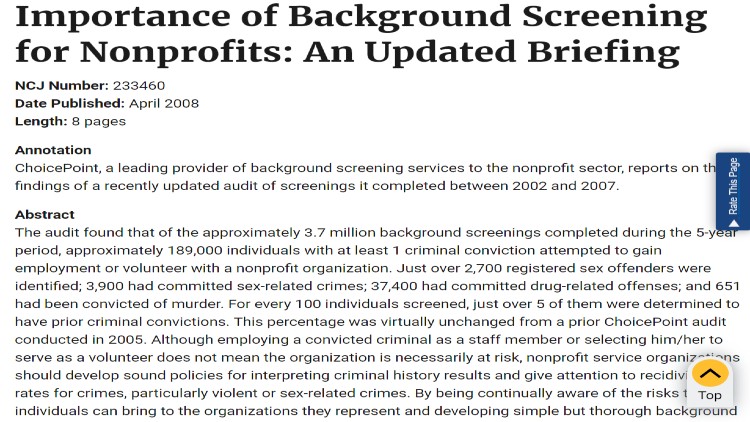
Nonprofit organizations consist of a board of directors which are volunteers from the community, usually business leaders or community organizers, paid employees, and volunteers, including interns.
It is vital that a background check be conducted on each agent or individual that works with the nonprofit organization, and the level of the background check will vary based on the position the person holds.
The Board of Directors members is the governing body of the nonprofit organization and the members also carry a financial burden regarding the organization.
In other words, the funding for a nonprofit is the responsibility of the board of directors who will either solicit funding as part of their function or will delegate funding matters to the executive director or hire a grant writer. Board of director background checks is typically conducted by the state agency that performs background checks for paid employment.
A background check for a nonprofit board member will include a criminal history check in addition to a credit history since the board oversees the finances of the agency. Background checks will include fingerprinting as well as a national background screening.
Paid employees with a nonprofit organization must also undergo a background check to make sure they do not have any disqualifying offenses on their record. These checks are also usually conducted by the state agency that does employment background checks.
The bulk of the workforce for a nonprofit organization is its roster of volunteers. Volunteers will work in both supervised and unsupervised statuses. Supervised volunteers work directly with a paid employee who supervises the volunteer. For example, a volunteer at a school or daycare will work under the direct supervision of a teacher or administrator.
Unsupervised volunteers work independently on behalf of the organization. For example, Meals On Wheels volunteers often deliver meals to seniors and isolated individuals with no or limited transportation or resources without being accompanied by a staff member or experienced volunteer that has already been vetted or cleared.5
Volunteer background checks typically consist of a name-based search to look for disqualifying offenses such as violent offenses such as murder, rape, or violent assaults, felony crimes such as larceny, weapons offenses or felony drug offenses, or other crimes that will present a hazard to the community or prevent the volunteer from performing the duties of the volunteer position. These name-based searches can be conducted at the local or state level.
Background Check Services for Nonprofits: Professional Background Search Agencies
There are a number of paid search sites that provide affordable background checks for non-profits employing volunteers or interns. While these sites may be convenient, the information returned may not be as accurate as that provided by state agencies, and it’s important to make sure they are in compliance with state and federal regulations.
Paid search sites must be in compliance with all state laws regarding background checks, as well as adhere to the Fair Credit Reporting Act (FCRA) requirements for credit history when it is part of the nonprofit’s background check request. FCRA limits credit history checks for volunteers to seven years.6
When performing non profit background checks an organization, it is important to look at the position the person will hold with the non-profit, and then make sure the background check matches the level of responsibility of the position. There are several types of background checks and each type provides a different level of information.
The table below outlines the various types of background checks that are conducted in nonprofit organizations.
| Type of Background Check |
Brief Explanation of Check |
Nonprofit Position |
| Level 1 Background Check |
Name-based search includes criminal history, sex offender registry search (state only) |
Supervised volunteers with limited or no contact with clients |
| Level 2 Background Check |
Fingerprint based state and national criminal record check |
Unsupervised Volunteers
Supervised volunteers with client contact |
| Level 3 Background Check |
Fingerprint based state and national check, education verification, employment verification |
Interns
Paid Employees
Board of Director Members |
| Credit Check |
Credit report in compliance with FCRA guidelines. |
Board of Director Members
Executive Director
Financial Officer
Volunteers who will handle money for the organization |
Background check information can vary from state to state, and it can depend on the level or type of check performed.
The information available in nonprofit background checks can differ based on the responsibilities of the person and whether the individual is a paid employee of the organization or a volunteer.
Paid employee background checks are the same for nonprofits as they are for public sector/government positions or for-profit businesses. This can include a national criminal background check including fingerprinting, employment verification, and education verification. It can also include credit history for positions involving payroll or funding.
Criminal histories show misdemeanor and felony convictions unless they have been sealed or expunged. A misdemeanor can stay on your record indefinitely unless sealed or expunged by a court order. Therefore, a misdemeanor charge can appear on a non-profit background check.
When charges are dismissed, it does not necessarily mean you have a criminal record. Some states have passed laws stating charges that resulted in non-convictions cannot appear on a background check. For example, California automatically removes a charge from a criminal record when there is no conviction.
Determining if there’s a secret indictment or warrant can be challenging. Having a warrant may appear on a background check, potentially revealing pending charges. Consequently, a nonprofit organization might not know about a person’s legal situation until the indictment is unsealed and the person is apprehended.
Traffic violations may appear on criminal background check screenings for volunteers or nonprofits, particularly if the position involves driving and requires a review of driving history. Traffic violations that are misdemeanors or felony offenses can also show up on a nonprofit criminal background check.
Volunteer background checks usually consist of a local, state, or national criminal history which includes criminal convictions, and sex offender registry information, and could potentially include pending charges.
Additional Screenings on Background Checks for Nonprofit Board Members
As discussed earlier, the board of director members are responsible for the financial stability of the nonprofit organization, so board members can also be subjected to a credit history screening in compliance with FCRA guidelines limiting the credit check to seven years prior to appointment to the board.
Board of Director members may also undergo a reference check to make sure they will be a good fit for the organization. Reference checks can be done via telephone or email to get a better picture of the potential board member.
Board members for organizations that work with victims of domestic abuse, sexual assault, or child endangerment may also check to see if the potential member is subject to a restraining order or domestic violence protection order. Since restraining orders are court records, they are public and can appear on a person’s record. Violations of a restraining order are often criminal charges which will also appear on a person’s record.
The amount of information and type of background check needed will determine the amount of time it takes to get a report back.
How Long Do Background Checks Take for Non Profits?
Non profitable background checks on volunteers or paid employees vary in completion time. They can be processed quickly, within minutes, or may take several days or weeks, depending on the complexity of the search.
Name-based searches can return results in a few minutes in most cases; however, if the individual has a common name, multiple hits can be returned. Searches that are name-based are done locally in most cases, or through online search portals for government agencies.
For example, a name-based search of the National Sex Offender Registry can provide information almost instantly.
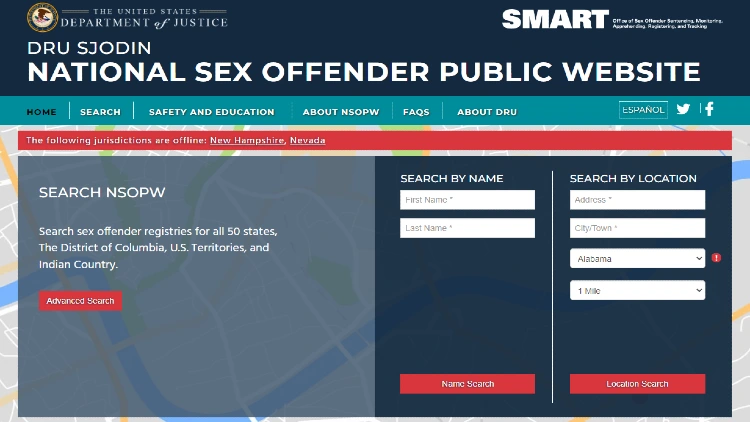
Fingerprint-based searches can take a few days to a couple of weeks depending on the agency that facilitates the search and if they have a backlog of searches to perform. FBI rap sheet reports take 3-5 days to process online requests; however, mail-in requests can take 2-4 weeks to complete.
Background checks that require verifying employment and education can take even longer since these checks include contacting previous employers and waiting to receive official transcripts regarding education. When the check also includes reference checks, it can take several weeks to complete the process.
Laws for Screening & Checking Criminal History of Non Profit Volunteers
Non profit background checks for volunteers must follow the same state and federal laws as background checks for paid employees, and some states have passed legislation requiring background checks for volunteers in certain positions or with specific organizations.
Background checks in churches also are required to follow the same state and federal laws as secular nonprofit organizations. This means that any positions involving work with children or other vulnerable populations require screening of the volunteer in that position.
The table below lists the volunteer background laws in each state with a brief explanation of the law and who is impacted.
| State |
Volunteer Background Check Law |
How Law is Applied |
| Alabama |
38-13-3 |
Volunteer positions working with children |
| Alaska |
7 AAC 10.900 |
Volunteers with contact with vulnerable populations. |
| Arizona |
SB 1504 |
Volunteers working with children are required to have a fingerprint-based check within 7 days of starting |
| Arkansas |
12-12-1607 |
Authorizes nonprofit organizations to complete volunteer background checks |
| California |
AB 506 |
Requires background check on all volunteers working with children |
| Connecticut |
CGS 19a-80(c) |
Requires background check on all volunteers working with children |
| Delaware |
Senate Bill 256 |
Requires background check on all volunteers working with vulnerable populations |
| Florida |
397.4073 |
Requires background check on all volunteers working with vulnerable populations |
| Georgia |
35-3-34.2 |
Volunteers who will be working unsupervised with children must undergo a fingerprint based background check |
| Hawaii |
Act 119 of 2014 Session |
Requires background check on all volunteers working with vulnerable populations |
| Idaho |
Code 33-130 |
Requires background check on all volunteers working with children |
| Illinois |
225 ILCS 46/ |
Requires background check on all volunteers working with vulnerable populations |
| Indiana |
IC 10-13-3-38.5 |
Requires background check on all volunteers working with children |
| Iowa |
455A.41 a |
Volunteers who will be working unsupervised with children must undergo a background check |
| Kansas |
KSA 65-516 |
Requires background check on all volunteers working with children |
| Kentucky |
160.151 |
Requires background check on all volunteers working with children |
| Louisiana |
RS 15-578 |
Requires background check for volunteers in positions that would require one for paid employees |
| Maine |
Chapter 53 |
Requires background check on all volunteers working with vulnerable populations |
| Maryland |
Family Law 5-560 |
Requires background check on all volunteers working with children |
| Massachusetts |
M.G.L. c. 71, § 38R |
Requires background check on all volunteers working with children |
| Michigan |
MCL 722.115d |
Requires background check on all volunteers working with children |
| Minnesota |
123B.03 |
Requires background check on all volunteers working with children |
| Mississippi |
MCIC Policy 9.001 |
Requires background check on all volunteers working with vulnerable populations |
| Missouri |
168.133 |
Requires background check on all volunteers working with children |
| Montana |
HB 590 |
Requires background check on all volunteers working with children |
| Nebraska |
43-3709 |
Requires background check on all volunteers working with children |
| Nevada |
SB 185 |
Requires background check on all volunteers working with children |
| New Hampshire |
RSA 189-13a |
Requires background check on all volunteers working with vulnerable populations |
| New Jersey |
PL 1999, Chapter 432 (C. 15A:3A-1) |
Permits nonprofit organization to conduct background checks on volunteers |
| New Mexico |
HB 0431 |
Requires background check on all volunteers working with children |
| New York |
14 CRR-NY 550 |
Requires background check on all volunteers working with vulnerable populations |
| North Carolina |
NCGS 108A-133 |
Requires background check on all volunteers working with vulnerable populations |
| North Dakota |
N.D.C.C.§ 12-60-16.6 |
Requires background check on all volunteers working with children |
| Ohio |
109.575 |
Requires background check on all volunteers working with children |
| Oklahoma |
340:2-35.4 |
Requires background check on all volunteers working with vulnerable populations |
| Oregon |
326-607 |
Requires background check on all volunteers working with children |
| Pennsylvania |
6303 |
Requires background check on all volunteers working with children |
| Rhode Island |
16-2-18.4 |
Requires background check on all volunteers working with children |
| South Carolina |
406-04-DD |
Requires background check on all volunteers working with children |
| South Dakota |
67:42:07:14 |
Requires background check on all volunteers working with children |
| Tennessee |
71-3-507 |
Requires background check on all volunteers working with children |
| Texas |
377.117 |
Requires background check on all volunteers working with children |
| Utah |
495-885-3 |
Requires background check on all volunteers working unsupervised with children |
| Vermont |
DAIL policy |
Requires background check on all volunteers working with vulnerable populations |
| Virginia |
6VAC35-41-180 |
Requires background check on all volunteers working with vulnerable populations |
| Washington |
RCW 43.43.830 |
Requires background check on all volunteers working with children |
| West Virginia |
16-49-1 |
Requires background check on all volunteers working with vulnerable populations |
| Wisconsin |
Volunteers for Children Act |
Requires background check on all volunteers working with children |
| Wyoming |
7-19-201 |
Requires background check on all volunteers working with vulnerable populations |
Background checks for nonprofits can be conducted annually or on a multi-year rotation based on the needs of the organization, the state laws and whether or not the volunteer remains active with the nonprofit agency.
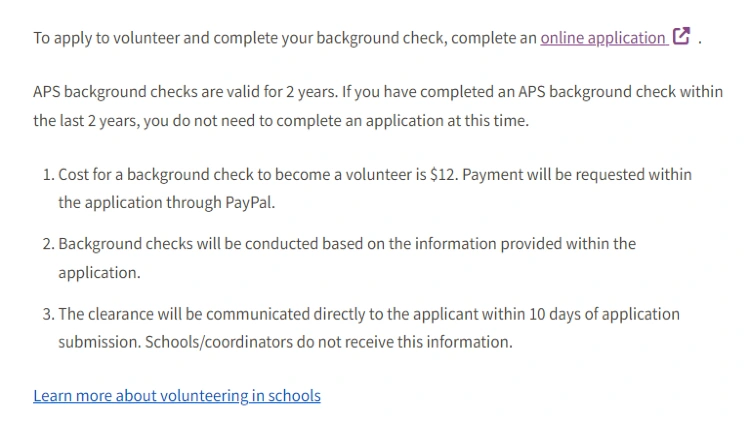
In addition to state laws, there are federal laws that organizations must follow when vetting volunteers. Vetting means the person has been screened and approved for the position they are seeking.
Federal Guidance for Non Profit Background Checks
There are primarily three laws that nonprofits must know regarding background checks for volunteers. These laws outline the limitations of volunteer background screenings as well as the requirements.
The first law is the National Child Protection Act of 1993. This law requires any organization or agency that works with children to conduct a background check on volunteers with the organization. This background check should include a search of child abuse registries, criminal history, and a search of the sex offender registry (both state and national).7 This includes background checks for volunteers in churches that work with children such as youth pastors or youth leaders.
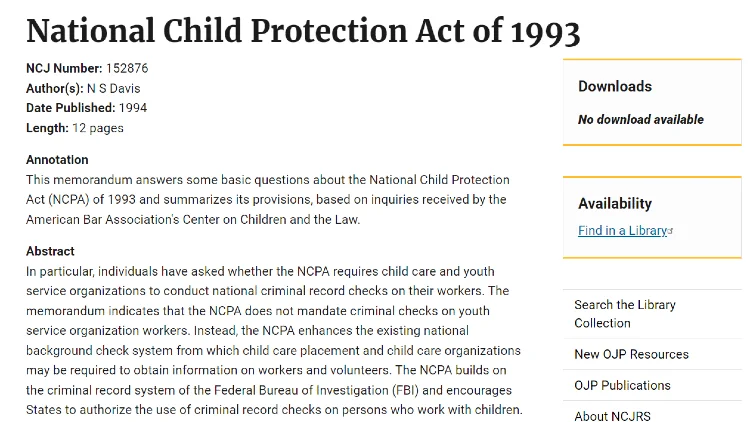
In 1998, the Volunteers for Children Act amended the National Child Protection Act which allows nonprofits to access files of federal criminal records in addition to state records. This is allowed even if there is not a state law that specifically grants this access.8
The third federal law to be aware of when conducting a volunteer background check is the Fair Credit Reporting Act. This limits the lookback period on volunteer credit history to seven years, and any third-party search sites that provide background checks must be FCRA compliant for the screening to be used.
To protect the organization, its clients, and the population as a whole, background screenings for volunteers and paid employees with nonprofits should follow the same guidelines as any agency or organization and ultimately, non profit background checks can help get the best volunteers in the community.
Frequently Asked Questions
What Information Does a Nonprofit Background Report Contain?
A nonprofit background check contains a criminal history, employment history and education for most screenings. A nonprofit background check for an executive director or board member can also include reference checks and a credit history report.
What Appears in a Background Check for a Board Member of a Nonprofit Organization?
Board member nonprofit background checks include a credit history in addition to a criminal background report. It can also include recommendations and referrals from community leaders. Board member screenings also include employment and education verification. Board members are often nominated and voted on by other sitting board members or a committee.
Can a Nonprofit Organization Run a Background Check Without the Volunteer’s Consent?
No, in order to be in compliance with state and federal laws, nonprofit organizations must obtain consent of the volunteer before conducting a background check. State law enforcement will not conduct a background check without the signed consent form attached or uploaded. Failure to obtain consent exposes the nonprofit to not only legal action, but can greatly damage the agency’s reputation in the community. This will directly impact community donations needed to support nonprofit operations.
1 The Nonprofit Sector in Brief 2019 | National Center for Charitable Statistics. (2020, April 6). National Center for Charitable Statistics. Retrieved September 17, 2022, from <https://nccs.urban.org/publication/nonprofit-sector-brief-2019#the-nonprofit-sector-in-brief-2019>
2 Warrant Search. (n.d.). Travis County Sheriff’s Office. Retrieved September 17, 2022, from <https://www.tcsheriff.org/services/public-resources/warrant-search#/wows>
3 Background Checks | Miami Gardens, FL. (n.d.). Miami Gardens Police Department. Retrieved September 17, 2022, from <https://www.miamigardenspolice.org/578/Background-Checks>
4 Identity History Summary Checks — FBI. (n.d.). FBI. Retrieved September 17, 2022, from <https://www.fbi.gov/services/cjis/identity-history-summary-checks>
5 FAQs. (n.d.). Meals on Wheels. Retrieved September 17, 2022, from <https://www.mealsonwheelsamerica.org/americaletsdolunch/faqs>
6 Fair Credit Reporting Act. (n.d.). Federal Trade Commission. Retrieved September 17, 2022, from <https://www.ftc.gov/legal-library/browse/statutes/fair-credit-reporting-act>
7 Text – H.R.1237 – 103rd Congress (1993-1994): National Child Protection Act of 1993. (n.d.). Congress.gov. Retrieved September 17, 2022, from <https://www.congress.gov/bill/103rd-congress/house-bill/1237/text>
8 Text – H.R.2488 – 105th Congress (1997-1998): Volunteers for … (n.d.). Congress.gov. Retrieved September 17, 2022, from <https://www.congress.gov/bill/105th-congress/house-bill/2488/text?r=63&s=1>

